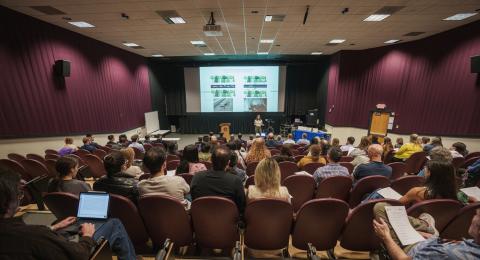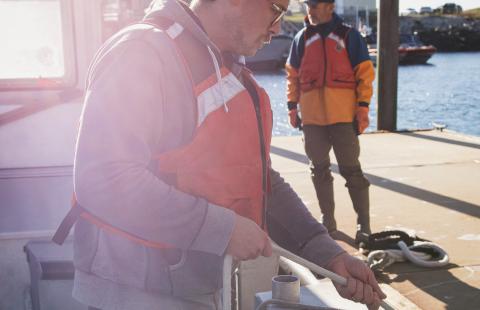The UNH Graduate School prides itself on the wide scope of community-building and engagement opportunities available to our students, both across and beyond campus. We strive to create an environment focused on a sense of belonging, and initiatives for engaged scholarship that allow students to connect their work to the broader community and find avenues for support. Browse the information on this page to learn about the multitude of resources at your disposal! For questions, please contact Dr. Dovev Levine at Dovev.Levine@unh.edu.
Community Engaged Courses and Certificate Programs
The emerging fields of citizen science and community science have expanded in recent years, providing new connections between scientific research and community decision-making. Dedicated study through a graduate certificate enables students to focus on conducting robust and authentic citizen and community science projects.
Coastal policy (also referred to as marine or ocean policy) is focused on public policy and governance as it relates to marine, ocean, and coastal resources. A graduate certificate (stand-alone or companion to another graduate degree) provides unique preparation and dedicated study appropriate for a range of students and professionals with interests in applied coastal science, policy, and/or management and will help students develop expertise and grounding in policy processes.
The interdisciplinary feminist students graduate certificate is designed for professionals and graduate students in other disciplines at UNH to pursue feminist scholarship and bring a feminist perspective to bar on research in their own field. You'll have the opportunity to study and conduct research in areas that support your own interests and career goals, such as social justice, literature, political theory and aging.
Course Number: GRAD 834
This three-credit course introduces the emerging field of citizen science, including community science, exploring theories and applications in natural, physical, and social science fields. The course will focus on best practices for effective projects and teams and include topics such as volunteer engagement, methods for data sharing, and issues or social justice in citizen science. Offered spring semester annually.
Course Number: MARI 801
Join other Graduate students, faculty and invited presenters to discuss current topics in coastal science, management, and policy, including federal, tribal, state, and municipal policy developments, new scientific findings that might inform management, citizen and community science developments & stakeholder engagement.
Course Number: GRAD 844
This course provides a foundation for students from various disciplines to develop a fundamental understanding of the theory and practice of stakeholder and community engagement in natural resource management across a range of ecosystem and governance scales (with a focus on the US Northeast. Explore case studies and track topics of interest throughout the course).
Educational institutions, communities and businesses have a critical role to play in addressing global sustainability challenges like climate change, and the first step in the journey toward sustainability is to assess the existing organizational “footprint.” Sustainability assessment skills such as carbon footprinting are increasingly in demand professionally, as more corporations and institutions make public commitments to sustainability and carbon reduction goals. After completing the Carbon Footprinting Certificate Program, you will be prepared to tackle a GHG inventory for your school, organization, business, or community
Fellowships and Initiatives
The UNH Graduate Engagement Hub is a central and visible place where requests and needs of state and regional-based organizations can be matched with the needs and skills of graduate students.
The UNH Sustainability Institute Fellowship Program pairs exceptional UNH undergraduate students and post-baccalaureates (grad students and recent grads) from UNH and universities across the United States* with municipal, educational, corporate, and non-profit partners to work on transformative sustainability projects. Don't think your field of study connects with sustainability? Rethink that. We define sustainability broadly - as framed by the UN 17 Sustainable Development Goals.
*International students who are currently enrolled in a U.S college or university are welcome and encouraged to apply.
Accelerate 2 Industry (A2I) is designed specifically for graduate students looking to transition into industry roles and create their professional journey. This series will consist of three individual sessions with industry professionals from humanities and STEM-related backgrounds.
The New England Municipal Sustainability (NEMS) Network is a consortium of New England cities and towns that collaborate to build more sustainable communities. The NEMS Network vision is to create a sustainable New England by building strong connections among municipal sustainability professionals throughout the region, allowing members to accomplish more than would be possible alone.
The New Hampshire-Maine Leadership Education in Neurodevelopmental Disabilities Program (NH-ME LEND) provides interdisciplinary leadership training designed to enhance the expertise and leadership skills of practicing professionals, self-advocates, and family members in order to meet the complex needs of individuals with autism and other related neurodevelopmental disabilities.
Communicating Your Research
A casual meet-up at local hotspots: scientists share their cutting-edge research with you! It's a venue where you get to hear about the cool research going on in our local community from experts doing the work. Topics range from space lightning to lightning bugs, from wildfires to coastal flooding, from desert mice to oysters. Learn More!
The Three Minute Thesis (3MT®) is a competition designed to help students develop essential academic, presentation, and research communication skills. Participants enhance their ability to present their research concisely and effectively in just three minutes, using language that resonates with a non-specialist audience.
The Moorhead Writing Academy takes place in January and provides a space to work in the company of others. The Graduate School provides coffee, tea, and snacks to fuel your productivity. Lunch is also provided every day, so you don't have to worry about bringing anything besides your work! In addition to dedicated space and time to work, we have optional workshops scheduled to support your writing.
The UNH Graduate Research Conference is an annual showcase for UNH graduate students from all academic disciplines present their work and research on campus over the course of two days, oral presentations and poster sessions every year. UNH GRC is open to any graduate student or postdoc at UNH who would like to present research in either poster or oral form.
Organizations and Partners
The Center for Engaged Communities (EnCo) is the home of NH Listens and expanding research on civic health and social trust. EnCo builds on applied work for navigating controversy and misinformation with proactive engagement strategies. When communities involve people in decisions that affect their lives, it leads to fairer, more effective policies and strengthens civic health. EnCo connects the Carsey School of Public Policy to grassroots policy, engagement practice, and research, reinforcing New Hampshire's civic health.
UNH Cooperative Extension puts trusted information and practical know-how in the hands of New Hampshire citizens and organizations by improving the methods, understanding and capabilities of NH's people, businesses and communities. We are at work in every county, making the state's critical industries stronger; developing vibrant communities and municipal leaders, and fostering healthy families and informed, engaged citizens.
Participatory science can go by many names -- citizen science, community science, volunteer research -- any effort that involves members of the public collaborating with professional researchers to investigate the world. Public participants can be involved in many ways, including by contributing observations, collaborating on research design, and co-creating research projects.
The Sustainability Institute’s mission is to be a catalyst, convener, and champion of sustainability ideas and actions across and beyond the University of New Hampshire. We foster a culture of sustainability that permeates the civic, professional, and personal lives of members of our community.
Campus Compact for New Hampshire (CCNH) celebrates students, staff and representatives from local colleges and nonprofits who demonstrate exceptional community service in higher education. Learn More!
UNH has over 200 recognized student organizations. Learn more and get plugged in with student groups and events through Catalyst, you’re place for all things student org related. Here you can contact organizations you may be interested in, find events and much more.
The Beauregard Center is an inclusive student center and a welcoming space for all students that offers a wide range of student support, engagement, development, and success services and programs that enhance all students’ social and academic growth.
The Office of International Students and Scholars provides immigration advising and support. They also coordinate programs to bring our international, campus and local communities together. OISS will help you discover opportunities at UNH to immerse in American culture and share your own traditions with others from the U.S. and around the globe.
Both offices can be found in the Memorial Union Building.
The Talloires Network of Engaged Universities is a growing global coalition of 448 university presidents, vice-chancellors, and rectors in 92 countries who have publicly committed to strengthening the civic roles and social responsibilities of their institutions. It is the largest international network focused particularly on university civic engagement.
Accessibility
Student Accessibility Services (SAS) ensures reasonable accommodations and equal access to all UNH students with documented disabilities. Their services are available to students who have permanent or temporary disabilities that affect academics, housing, and parking.
The UNH Office of Military and Veterans Services provides high quality support to student veterans, service members, and other military-affiliated students such as dependents.
The UNH Civil Rights & Equity Office oversees the University's compliance efforts regarding Civil Rights, Title IX, Discrimination, and ADA laws and regulations. Visit this site to learn more about policies that impact you as a student, support resources and information on reporting.
This guide includes some of the core offices and departments across UNH with support for First Generation Students. There are links to many types of resources including academic, self care, financial aid, and student organizations here at UNH and throughout the local area as well. Learn More!
Community Events & Gatherings
- Graduate School Current Happenings
- MUB Events occur throughout the year. From leadership to international and cultural events, there's always something going on!
- Campus Recreation makes staying – and getting – healthy and active easy. From fitness classes, to outdoor adventures, to intramural sports - campus recreation offers a variety of ways to connect and stay moving.
- UNH Calendars & Events master calendar of events happening on the Durham Campus
- Durham NH Community Events Calendar get connected with
- Portsmouth NH Community Events Calendar shares free and low cost events. Portsmouth is a walkable city, and easy to access using the Wildcat Transit Line.



